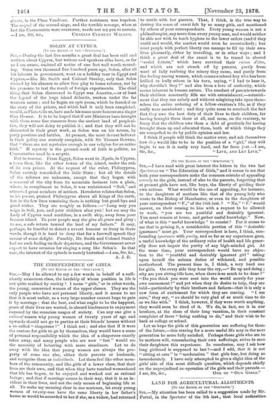SOLON AT CYPRUS.
[TO THE EDITOR OY TILE SPECTATOR."]
Sin,—During the last five months a great deal has been said and written about Cyprus, but writers and speakers alike have, as far as I am aware, omitted all notice of one fact well worth record- ing. Some two thousand five hundred years ago, Solon, after all his labours in government, went on a holiday tour to Egypt and Cyprus,—like Mr. Smith and Colonel Stanley, only that Solon wished by his absence to allow free play to home reforms, not by his presence to test the result of foreign experiments. The chief thing that Solon discovered in Egypt was America,—or at least the legend of the huge island Atlantis, sunken under the far western ocean ; and he began an epic poem, which he founded on the story of the priests, and which had it only been completed, would, as Plato tells us, have made his name more famous as a singer than Homer. It is to be hoped that if our Ministers have brought with them some fine romance from the ancient land of perplexi- ties, they will not delay to publish it ; and that they will not be distracted in their great work, as Solon was on his return, by party passions and battles. At present, the most devout believer in their policy can scarcely complain, with Sir Thomas Browne, that " there are not mysteries enough in our religion for an active faith." If mystery is the ground-work of faith in politics, no Conservative need be a sceptic.
But to resume. From Egypt, Solon went to iEpeia, in Cyprus, a town then, like the other towns of the island, under the rule of its own prince. At the request of the ruler, Philocyprus, Solon entirely remodelled the little State ; but all the details of the reforms are unknown, except that they began with a removal of the city from its mountain fastness into a plain, where, in compliment to Solon, it was rechristened "Soli," and attracted great numbers of settlers. Herodotus relates that Solon, in his poems, praised Philocyprus above all Kings of the earth, but in the few lines remaining there is nothing but good-bye and good wishes. They are roughly as follows :—" Long may you reign in Soli, you, and your children after you! but me may the Lady of Cyprus send scathless, in a swift ship, away from your famous island. To your people may she give all grace and glory ; to me, a safe return toward the land of my fathers." It may, perhaps, be fanciful to detect a covert humour or irony in these words, though it is hard to deny that for a farewell speech they savour of some delight. Possibly, Mr. Smith and Colonel Stanley had no such feeling on their departure, and the Government never expect to have occasion for singing a song like Solon's. In that case, the interest of the episode is merely historical.—I am, Sir, &c., A. J. B.


































 Previous page
Previous page